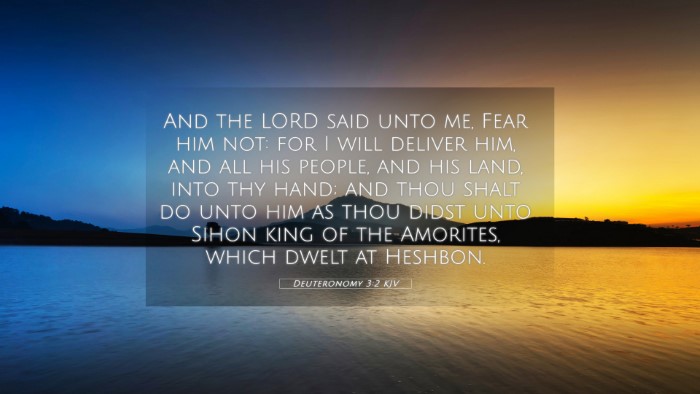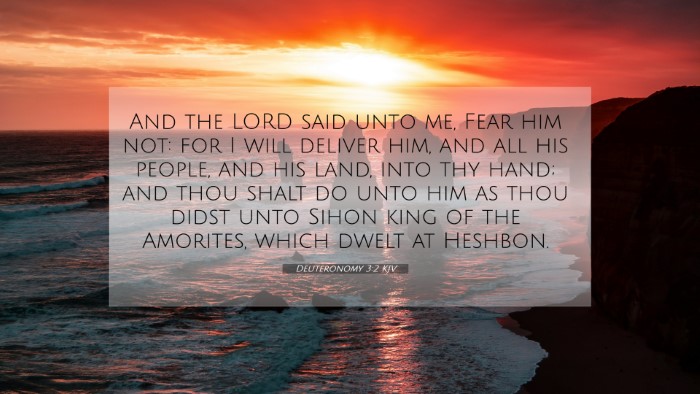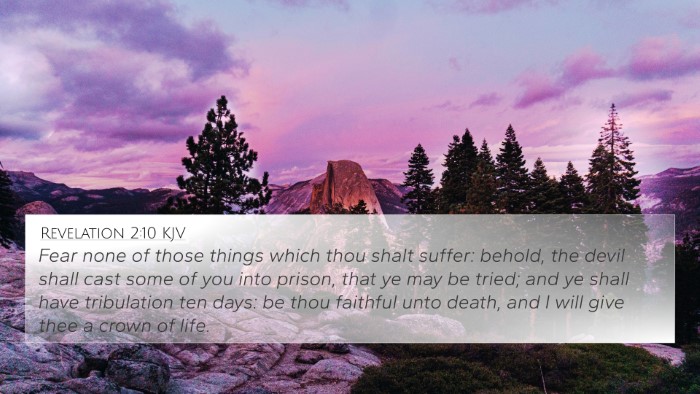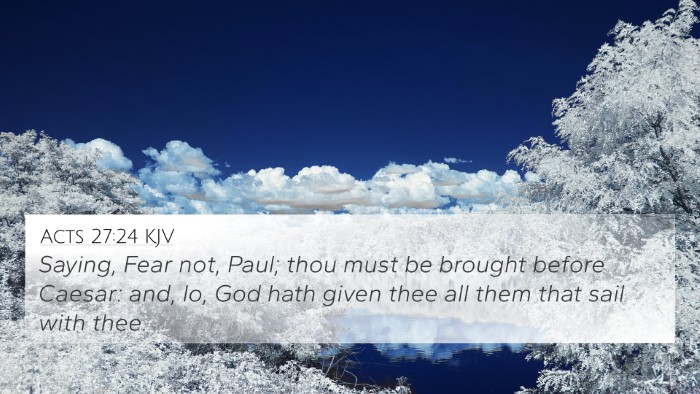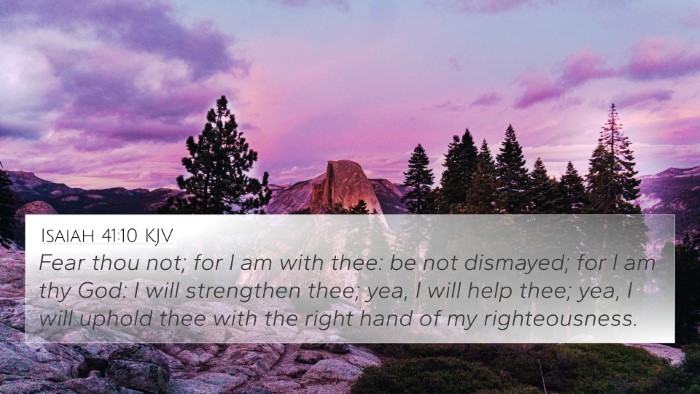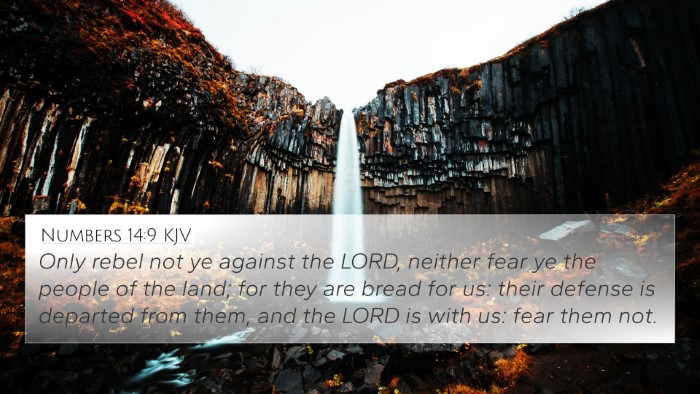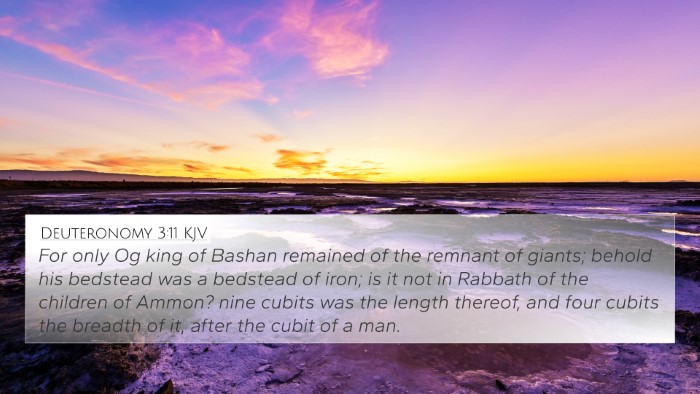Understanding Deuteronomy 3:2
Bible Verse: Deuteronomy 3:2
“And the Lord said unto me, Fear him not: for I will deliver him, and all his people, and his land, into thy hand; and thou shalt do unto him as thou didst unto Sihon king of the Amorites, which dwelt at Heshbon.”
Summary of Deuteronomy 3:2
This verse comes at a pivotal moment in the narrative, emphasizing God's assurance to Moses regarding the impending conflict with Og, the king of Bashan. This assurance serves as both a reminder of past victories and a profound statement of faith in God's power and the support He provides His people in facing their adversaries.
Commentary Insights
Matthew Henry's Commentary
Matthew Henry emphasizes that this verse reveals God’s providence and the assurances He gives to His people. He notes that the phrase *“Fear him not”* is a divine reassurance that reflects God’s control over Israel’s enemies. The authority of God is central in assuring Moses that the outcome is already decided in their favor.
Albert Barnes' Notes
Albert Barnes elaborates that God directly speaks to Moses, reinforcing the idea that despite any formidable appearance of enemies, God's power is omnipotent. Barnes highlights that the confidence bestowed upon Moses is rooted in his past experiences of victory over Sihon, showcasing a historical theological narrative that builds faith.
Adam Clarke's Commentary
Adam Clarke discusses the significance of the specific mention of Og, noting that he was a remnant of the giants in the land, thus representing seemingly insurmountable challenges. Clarke points out that God's commands and reassurances encourage believers to confront their fears with the confidence rooted in divine promise and past victories.
Key Themes and Concepts
- Divine Assurance: The verse manifests God's promise of victory, encouraging leaders like Moses to trust in divine guidance amidst uncertainty.
- Historical Context: The reference to past victories serves as a spiritual encouragement for present challenges, illustrating God's consistent faithfulness.
- Combat and Conquest: This verse highlights the motif of divine warfare, where God fights on behalf of His people, reinforcing the persistent theme of God as a protector.
Bible Verse Cross-References
- Numbers 21:33-35: The account of Israel's defeat of Og, confirming God's promise as stated in Deuteronomy 3:2.
- Deuteronomy 2:24-25: God's instruction to begin the battle against Sihon, which illustrates His plan of action against the kingdoms.
- Isaiah 41:10: "Fear thou not; for I am with thee..." parallels the reassurance provided in this verse.
- Romans 8:31: "If God be for us, who can be against us?" echoes the theme of divine support found in Deuteronomy 3:2.
- Joshua 1:9: God commands Joshua to be strong and courageous, paralleling Moses’ confidence in combat.
- 2 Chronicles 20:15: “The battle is not yours, but God's,” emphasizing divine intervention in conflict.
- Philippians 4:13: "I can do all things through Christ which strengtheneth me," reinforcing the theme of empowerment through divine strength.
Connecting Themes
The themes present in Deuteronomy 3:2 resonate throughout the Bible, emphasizing historical fidelity and divine reassurance across both the Old and New Testaments. The motif of God empowering His leaders to face insurmountable odds continues to be significant.
Practical Applications
- Understanding God’s past faithfulness can embolden believers today to face their own challenges.
- Recognizing that God’s commands come with the assurance of support can alleviate fear and encourage action in faith.
- Personal experiences of God’s deliverance should be shared within communities to strengthen collective faith.
Thematic Bible Verse Connections
This verse not only stands alone but invites exploration of other scriptures that speak to God’s omnipotent assurance and deliverance, often seen through the lens of Christ in the New Testament, revealing a continuous narrative of God’s relationship with His people.
Tools for Bible Cross-Referencing
Utilizing a Bible concordance or a comprehensive Bible cross-reference guide can significantly enhance the study of interconnections among scriptures, making the process of finding related verses more efficient and illuminating.
Conclusion
The message in Deuteronomy 3:2 serves as a timeless reminder of God's enduring covenant with His people, the call to act in faith, and the assurance of His presence. Exploring its connections with other scriptures furthers the understanding of God's character, enhancing both individual and communal faith journeys.

